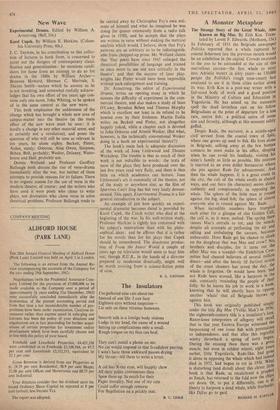A Monster Metaphor
The Strange Story of the Great Whale, Also Known as Big Mae. By Erib Kos. Trans- lated by Lovett F. Edwards. (Methuen, 15s.) IN February of 1953 the Belgrade newspaper Politika reported that a whale captured by coastal fishermen late the previous month would be on exhibition in the capital. Crowds swarmed to the zoo to be astounded at the size of this marvellous carcass—the first whale to stray into Adriatic waters in sixty years—as 150,000 people (by Politika's rough nose-count) had swarmed to see it in three cities earlier along its way. Erih Kos is a post-war writer with a fair-sized body of work and a good position in the Ministry of Culture and Education ilk Yugoslavia. He has seized on the mesmeric spell the dead leviathan cast on his fellow Belgradians as the point of departure for a less rare, native fish : a political satire of some size and ferocity, although at this moment safely gaffed.
Despic Rade, the narrator, is a midclle-aged
civil servant from the coastal town of Split, where one grows up used to fish. He lives alono in Belgrade, sulking away at the few human contacts he must make in his office, sleeping when he can avoid his landlady, visiting his sister's family as little as possible. His mistress is married to an even duller bureaucrat whorl' she pits against Rade for advancement. And then the whale happens. It is a great event in the city, the cult of the whale swells in absurd ways, and our hero (in character) seems alone, suddenly and conspicuously, in opposing On whale. The spleen of the little man is rouseu . against the big, dead fish; the spleen of almost everyone else is roused against Mr. Rade.
When incredible numbers have trampled
each other for a glimpse of this Golden Calf' the calf is, as it were, melted. The spring lila!' causes Mac's entrails to rot, and the stenen, despite all attempts at perfuming the air sod salting and embalming the carcass, beemiles unbearable. Does Rade get his chance to climb on the dungheap that was Mao and crow? Noo brothers and disciples, for it turns out OW affair Mac was a scandal—the Exhibition Com- mittee had cheated believers of several million dinars—and after the heroic (if furtive) action of the street cleaners has saved the day, the whale is forgotten. Or would have been, hau not Rade been around, like a harpoon in the side, constantly reminding the people of their folly. So he leaves his job to work in a bank, knowing that he will shortly have to opPose another 'whale' that all Belgrade throws ilP against him. This book was originally published simPlY under the title Big Mac (Teliki Mak') in 1956; the eighteenth-century title is a translator's 1115 Razor-keen interpreters of allegory will r.,ec,„ that in that year Eastern Europe witnessed .105 of one loose fish with Preen-5;16n.! to independence, and that after this regretful, wintry throwback a spring of sorts begari; During the ensuing thaw there was a Brea: stench; but even in coldest winter, eight year' earlier, little Yugoslavia, Rade-like, had goul it alone in opposing the whale which had ilidee".t
Wn died in 1953, had begun to rot in 1956.
is disturbing (and dated) about this clever ii,ttl book is that Rade, as recalcitrant a proplaels as Jonah, has returned to the fold now the chiP,A. are down. Or, to put it differently, one is liberty to harpoon a dead whale, while Starbucits


































 Previous page
Previous page